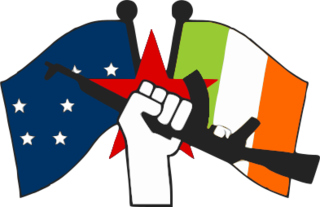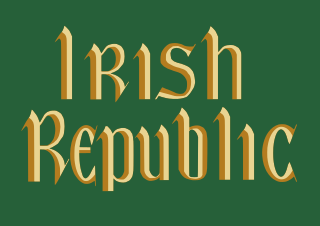Related Research Articles

The Continuity Irish Republican Army, styling itself as the Irish Republican Army, is an Irish republican paramilitary group that aims to bring about a united Ireland. It claims to be a direct continuation of the original Irish Republican Army and the national army of the Irish Republic that was proclaimed in 1916. It emerged from a split in the Provisional IRA in 1986 but did not become active until the Provisional IRA ceasefire of 1994. It is an illegal organisation in the Republic of Ireland and is designated a terrorist organisation in the United Kingdom, New Zealand and the United States. It has links with the political party Republican Sinn Féin (RSF).

The Provisional Irish Republican Army, officially known as the Irish Republican Army and informally known as the Provos, was an Irish republican paramilitary force that sought to end British rule in Northern Ireland, facilitate Irish reunification and bring about an independent republic encompassing all of Ireland. It was the most active republican paramilitary group during the Troubles. It saw itself as the army of the all-island Irish Republic and as the sole legitimate successor to the original IRA from the Irish War of Independence. It was designated a terrorist organisation in the United Kingdom and an unlawful organisation in the Republic of Ireland, both of whose authority it rejected.
The Real Irish Republican Army, or Real IRA (RIRA), was a dissident Irish republican paramilitary group that aimed to bring about a United Ireland. It formed in 1997 following a split in the Provisional IRA by dissident members, who rejected the IRA's ceasefire that year. Like the Provisional IRA before it, the Real IRA saw itself as the only rightful successor to the original Irish Republican Army and styled itself as simply "the Irish Republican Army" in English or Óglaigh na hÉireann in Irish. It was an illegal organisation in the Republic of Ireland and designated as a proscribed terrorist organisation in the United Kingdom and the United States.

The Troubles were an ethno-nationalist conflict in Northern Ireland that lasted for about 30 years from the late 1960s to 1998. Also known internationally as the Northern Ireland conflict, it is sometimes described as an "irregular war" or "low-level war". The conflict began in the late 1960s and is usually deemed to have ended with the Good Friday Agreement of 1998. Although the Troubles mostly took place in Northern Ireland, at times violence spilled over into parts of the Republic of Ireland, England, and mainland Europe.

The Irish National Liberation Army is an Irish republican socialist paramilitary group formed on 8 December 1974, during the 30-year period of conflict known as "the Troubles". The group seeks to remove Northern Ireland from the United Kingdom and create a socialist republic encompassing all of Ireland. With membership estimated at 80–100 at their peak, it is the paramilitary wing of the Irish Republican Socialist Party (IRSP).

The Loyalist Volunteer Force (LVF) was an Ulster loyalist paramilitary group in Northern Ireland. It was formed by Billy Wright in 1996 when he and his unit split from the Ulster Volunteer Force (UVF) after breaking its ceasefire. Most of its members came from the UVF's Mid-Ulster Brigade, which Wright had commanded. In a two-year period from August 1996, the LVF waged a paramilitary campaign in opposition to Irish republicanism and the Northern Ireland peace process. During this time it killed at least 14 people in gun and bomb attacks, almost all of them Catholic civilians killed at random. The LVF called off its campaign in August 1998 and decommissioned some of its weapons, but in the early 2000s a loyalist feud led to several killings. Since then, the LVF has been largely inactive, but its members are believed to have been involved in rioting and organized crime. In 2015, the security forces stated that the LVF "exists only as a criminal group" in Mid-Ulster and Antrim.
William Stephen Wright, known as King Rat, was a Northern Irish loyalist paramilitary leader who founded the Loyalist Volunteer Force (LVF) during The Troubles. Wright had joined the Ulster Volunteer Force (UVF) in his home town of Portadown around 1975. After spending several years in prison, he became a Protestant fundamentalist preacher. Wright resumed his UVF activities around 1986 and, in the early 1990s, replaced Robin Jackson as commander of that organisation's Mid-Ulster Brigade. According to the Royal Ulster Constabulary (RUC), Wright was involved in the sectarian killings of up to 20 Catholics but was never convicted for any.

The Ulster Volunteer Force (UVF) is an Ulster loyalist paramilitary group based in Northern Ireland. Formed in 1965, it first emerged in 1966. Its first leader was Gusty Spence, a former British Army soldier from Northern Ireland. The group undertook an armed campaign of almost thirty years during The Troubles. It declared a ceasefire in 1994 and officially ended its campaign in 2007, although some of its members have continued to engage in violence and criminal activities. The group is a proscribed organisation and is on the terrorist organisation list of the United Kingdom.

The Ulster Defence Association (UDA) is an Ulster loyalist paramilitary group in Northern Ireland. It was formed in September 1971 as an umbrella group for various loyalist groups and undertook an armed campaign of almost 24 years as one of the participants of the Troubles. Its declared goal was to defend Ulster Protestant loyalist areas and to combat Irish republicanism, particularly the Provisional Irish Republican Army (IRA). In the 1970s, uniformed UDA members openly patrolled these areas armed with batons and held large marches and rallies. Within the UDA was a group tasked with launching paramilitary attacks that used the cover name Ulster Freedom Fighters (UFF) so that the UDA would not be outlawed. The British government proscribed the UFF as a terrorist group in November 1973, but the UDA itself was not proscribed until August 1992.

The 1998 Northern Ireland Assembly election took place on Thursday, 25 June 1998. This was the first election to the new devolved Northern Ireland Assembly. Six members from each of Northern Ireland's eighteen Westminster Parliamentary constituencies were elected by single transferable vote, giving a total of 108 Members of the Legislative Assembly (MLAs).

The Red Hand Commando (RHC) is a small secretive Ulster loyalist paramilitary group in Northern Ireland that is closely linked to the Ulster Volunteer Force (UVF). Its aim was to combat Irish republicanism – particularly the Irish Republican Army (IRA) – and to maintain Northern Ireland's status as part of the United Kingdom. The Red Hand Commando carried out shootings and bombings, primarily targeting Catholic civilians. As well as allowing other loyalist groupings to claim attacks in their name, the organisation has also allegedly used the cover names "Red Branch Knights" and "Loyalist Retaliation and Defence Group". It is named after the Red Hand of Ulster, and is unique among loyalist paramilitaries for its use of an Irish language motto, Lamh Dearg Abu, meaning 'red hand to victory'.

Peter David Robinson is a retired Northern Irish politician who served as First Minister of Northern Ireland from 2008 until 2016 and Leader of the Democratic Unionist Party (DUP) from 2008 until 2015. Until his retirement in 2016, Robinson was involved in Northern Irish politics for over 40 years, being a founding member of the DUP along with Ian Paisley.

Ulster loyalism is a strand of Ulster unionism associated with working class Ulster Protestants in Northern Ireland. Like other unionists, loyalists support the continued existence of Northern Ireland within the United Kingdom, and oppose a united Ireland independent of the UK. Unlike other strands of unionism, loyalism has been described as an ethnic nationalism of Ulster Protestants and "a variation of British nationalism". Loyalists are often said to have a conditional loyalty to the British state so long as it defends their interests. They see themselves as loyal primarily to the Protestant British monarchy rather than to British governments and institutions, while Garret FitzGerald argued they are loyal to 'Ulster' over 'the Union'. A small minority of loyalists have called for an independent Ulster Protestant state, believing they cannot rely on British governments to support them. The term 'loyalism' is usually associated with paramilitarism.
The Ulster Independence Movement was an Ulster nationalist political party founded on 17 November 1988. The group emerged from the Ulster Clubs, after a series of 15 public meetings across Northern Ireland. Led by Hugh Ross, a Presbyterian minister from Dungannon, County Tyrone, the UIC sought to end what it saw as the tyranny of rule from London and instead set up an independent Northern Ireland.

The Loyal Orange Institution, commonly known as the Orange Order, is an international Protestant fraternal order based in Northern Ireland and primarily associated with Ulster Protestants. It also has lodges in England, Scotland and the Republic of Ireland, as well as in parts of the Commonwealth of Nations and the United States. The Orange Order was founded by Ulster Protestants in County Armagh in 1795, during a period of Protestant–Catholic sectarian conflict, as a fraternity sworn to maintain the Protestant Ascendancy in Ireland. The all-island Grand Orange Lodge of Ireland was established in 1798. Its name is a tribute to the Dutch-born Protestant king William of Orange, who defeated Catholic king James II in the Williamite–Jacobite War (1689–1691). The Order is best known for its yearly marches, the biggest of which are held on or around 12 July, a public holiday in Northern Ireland.

From 1969 until 1997, the Provisional Irish Republican Army (IRA) conducted an armed paramilitary campaign primarily in Northern Ireland and England, aimed at ending British rule in Northern Ireland in order to create a united Ireland.

The Troops Out Movement (TOM) was an Irish republican organisation formed in the United Kingdom in 1973, following actions by the British Army in Northern Ireland during the Troubles, including the Bloody Sunday and Ballymurphy massacres by the Parachute Regiment. The organisation's goals were to secure the withdrawal of British troops from Northern Ireland and support self-determination for the Irish people as a whole. These main aims were supplemented by smaller ones such as the demilitarisation of the Northern Irish police and the paramilitary Ulster Special Constabulary (USC) as well as opposition to discriminatory policies against Catholics in Northern Ireland. The TOM sought partnerships and other forms of cooperation with like-minded organisations in Ireland, Great Britain, and internationally.

The Drumcree conflict or Drumcree standoff is a dispute over yearly parades in the town of Portadown, Northern Ireland. The town is mainly Protestant and hosts numerous Protestant marches each summer, but has a significant Catholic minority. The Orange Order insists that it should be allowed to march its traditional route to and from Drumcree Church on the Sunday before the Twelfth of July. However, most of this route is through the mainly Catholic/Irish nationalist part of town. The residents, who see the march as sectarian, triumphalist and supremacist, have sought to ban it from their area. The Orangemen see this as an attack on their traditions; they had marched the route since 1807, when the area was mostly farmland.
This is a chronology of activities by the Provisional Irish Republican Army, an Irish republican paramilitary group in the 21st century.
The Disappeared are people believed to have been abducted, murdered and secretly buried in Northern Ireland, the large majority of which occurred during the Troubles. The Independent Commission for the Location of Victims' Remains (ICLVR) is in charge of locating the remaining bodies, and was led by forensic archaeologist John McIlwaine.
References
- ↑ profile of Gracey, The Independent, 1996
- ↑ CAIN website
- ↑ International Study of Peace/Conflict Resolution Organisations, 1999
- ↑ Self-styled loyalist pastor jailed, bbc.co.uk
- ↑ "Sunday Business Post report". Archived from the original on 9 August 2009. Retrieved 16 July 2010.
- ↑ "Beatrix Campbell, profile of McKenna, The Independent, 2000". Independent.co.uk . Archived from the original on 21 November 2010. Retrieved 27 August 2017.
- ↑ theirishobserver